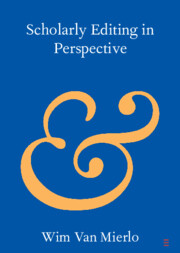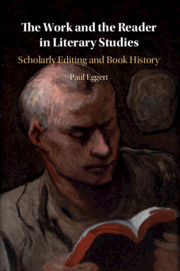Refine search
Actions for selected content:
3 results

Scholarly Editing in Perspective
-
- Published online:
- 20 February 2025
- Print publication:
- 20 March 2025
-
- Element
- Export citation
Chapter 5 - The Multiplications of Translation
- from Part I - Scope
-
-
- Book:
- The New Joyce Studies
- Published online:
- 01 September 2022
- Print publication:
- 08 September 2022, pp 79-94
-
- Chapter
- Export citation

The Work and the Reader in Literary Studies
- Scholarly Editing and Book History
-
- Published online:
- 19 August 2019
- Print publication:
- 29 August 2019
